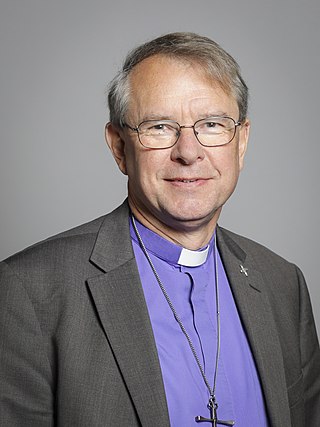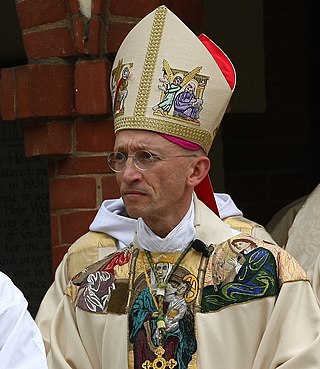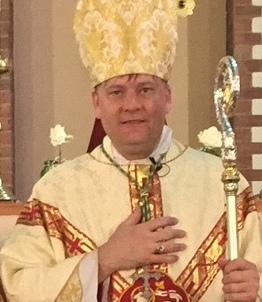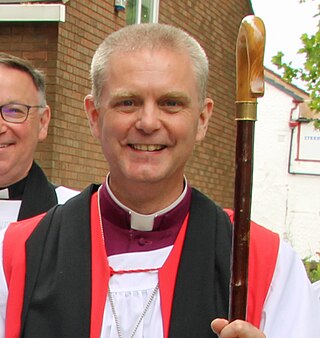Related Research Articles
Since the 1990s, the Anglican Communion has struggled with controversy regarding homosexuality in the church. In 1998, the 13th Lambeth Conference of Anglican bishops passed a resolution "rejecting homosexual practice as incompatible with Scripture". However, this is not legally binding. "Like all Lambeth Conference resolutions, it is not legally binding on all provinces of the Communion, including the Church of England, though it commends an essential and persuasive view of the attitude of the Communion." "Anglican national churches in Brazil, South Africa, South India, New Zealand and Canada have taken steps toward approving and celebrating same-sex relationships amid strong resistance among other national churches within the 80 million-member global body. The Episcopal Church in the U.S. has allowed same-sex marriage since 2015, and the Scottish Episcopal Church has allowed same-sex marriage since 2017." "Church of England clergy have appeared to signal support for gay marriage after they rejected a bishops' report which said that only a man and woman could marry in church." At General Synod in 2019, the Church of England announced that same-gender couples may remain recognised as married after one spouse experiences a gender transition. In 2023, the Church of England announced that it would authorise "prayers of thanksgiving, dedication and for God's blessing for same-sex couples."

Frederick Donald Coggan, Baron Coggan, was the 101st Archbishop of Canterbury from 1974 to 1980. As Archbishop of Canterbury, he "revived morale within the Church of England, opened a dialogue with Rome and supported women's ordination". He had previously been successively the Bishop of Bradford and the Archbishop of York.
The General Synod is the tricameral deliberative and legislative organ of the Church of England. The synod was instituted in 1970, replacing the Church Assembly, and is the culmination of a process of rediscovering self-government for the Church of England that had started in the 1850s.

The Diocese of Canterbury is a Church of England diocese covering eastern Kent which was founded by St. Augustine of Canterbury in 597. The diocese is centred on Canterbury Cathedral and is the oldest see of the Church of England.

John Geoffrey Inge is a bishop in the Church of England. He is currently the Bishop of Worcester in the Diocese of Worcester. From 2003 to 2007, he was Bishop of Huntingdon, a suffragan bishop in the Diocese of Ely.
David Staffurth Stancliffe is a retired Church of England bishop. He was Provost of Portsmouth Cathedral from 1982 to 1993, and the Bishop of Salisbury from 1993 to 2010. He is the third generation of his family to serve the ordained ministry.

The Evangelical Lutheran Church of Latvia is a Lutheran Protestant church in Latvia. Latvia's Lutheran heritage dates back to the Reformation. Both the Nazi and communist regimes persecuted the church harshly before religious freedom returned to Latvia in 1988. In contrast to Estonia, where state atheism reduced the once 80% Lutheran majority to barely 10% by 2011, the Latvian Lutheran church saw its membership drop to around 20% but has recovered and now includes approximately 30% of the population. The church reports having 250,000 members according to the Lutheran World Federation.
Stephen George Platten, FSA is a retired Anglican bishop. He was the last diocesan Bishop of Wakefield in the Church of England. He was consecrated in this role on 19 July 2003 and immediately prior to that was Dean of Norwich from 1995. He was installed at Wakefield Cathedral on 19 July 2003.

This article largely discusses presence of openly lesbian, gay, bisexual, and transgender and queer bishops in churches governed under episcopal polities. The existence of LGBTQ bishops in the Anglican, Lutheran, Methodist and other traditions is a matter of historical record, though never, until recently, were LGBTQ clergy and bishops ordained by any of the main Christian denominations. Homosexual activity was engaged in secretly. When it was made public, official response ranged from suspension of sacramental duties to laicisation.
Robert Mar Erskine Paterson is a British Anglican bishop. He was the Bishop of Sodor and Man in the Church of England from 2008 until his retirement in 2016.

Paul Roger Butler is a British Anglican bishop and a Lord Spiritual of the House of Lords. He is the Bishop of Durham, the diocesan bishop of the Diocese of Durham: his election was confirmed on 20 January 2014 and he was installed and enthroned in Durham Cathedral on 22 February 2014. On 12 September 2013 it was announced that he had been appointed as bishop-designate of Durham He was previously bishop of Southwell and Nottingham. He was installed at Southwell Minster on 27 February 2010. He served as the suffragan bishop of Southampton in the Diocese of Winchester from 2004 until 2010.
The Archbishops' Council is a part of the governance structures of the Church of England. Its headquarters are at Church House, Great Smith Street, London.
Stephen David Conway SCP is a British Anglican bishop. Since July 2023, he has served as the Bishop of Lincoln; he was previously Bishop of Ely and Bishop of Ramsbury.

Martin Clive Warner is an Anglican bishop in England. He is currently the Bishop of Chichester.

Jonathan Mark Richard Baker is a bishop of the Church of England. He is currently the suffragan Bishop of Fulham and was formerly the Bishop of Ebbsfleet.
Glyn Hamilton Webster is a retired British Anglican bishop who was the Bishop of Beverley in the Church of England from January 2013 to January 2022. He was previously the canon chancellor and Acting Dean of York at York Minster in the Diocese of York.

Janet Elizabeth "Jan" McFarlane is a British Church of England bishop and former speech and language therapist. She has been a Canon Residentiary of Lichfield Cathedral and honorary assistant bishop in the Diocese of Lichfield since 2020. In April 2023 she was appointed interim Dean of Lichfield Cathedral. She previously served as Bishop of Repton since her consecration as a bishop on 29 June 2016; and (additionally) Acting Bishop of Derby from 31 August 2018 to February 2019.
Joanne Caladine Bailey Wells is a British Anglican bishop, theologian, and academic. Since January 2023, she has served at the Anglican Communion Office in London as "Bishop for Episcopal Ministry". Previously, she was a lecturer in the Old Testament and biblical theology at Ridley Hall, Cambridge, and then associate professor of Bible and Ministry at Duke Divinity School, Duke University, North Carolina; From 2013 until 2016, she had served as Chaplain to the Archbishop of Canterbury; she was then Bishop of Dorking, a suffragan bishop in the Diocese of Guildford, 2016–2023.

Mark Simon Austin Tanner is a British Anglican bishop and academic. Since 2020, he has been the Bishop of Chester; he previously served as Bishop of Berwick, a suffragan bishop in the Diocese of Newcastle since his 2016 consecration as bishop; and from August 2011 until his consecration, he was the Warden of Cranmer Hall, Durham, a Church of England theological college.
References
- ↑ Europe Diocese – Prayer Diary, 2011–2012 [ permanent dead link ]
- 1 2 3 4 5 "New Deputy Lieutenants announced". Kent Online . 3 March 2005. Retrieved 31 August 2016.
- 1 2 3 4 5 6 "Graduation Success". Durham University. 30 June 2003. Retrieved 31 August 2016.
- 1 2 "Bishop of Durham to retire". BBC News . 26 August 2002. Retrieved 31 August 2016.
- 1 2 3 "How much does he earn?: No 48: The Rt Rev Michael Turnbull, Bishop of Durham" . The Independent . 1 October 1994. Archived from the original on 14 May 2022. Retrieved 31 August 2016.
- ↑ Garth Turner, Cathedrals and Change in the Twentieth Century (2011), 239.
- ↑ Robert Warren, Signs of Life: How Goes the Decade of Evangelism (Church House Publishing, 1995), 17.
- 1 2 3 Brown, Andrew (3 February 1994). "Durham's next bishop eschews controversy: Michael Turnbull believes in the Virgin Birth and in Hell" . The Independent . Archived from the original on 14 May 2022. Retrieved 31 August 2016.
- ↑ Maurice Chittendon, "Anglican Bishops Believe In Alien Life" in The London Sunday Times (5-7-98).
- ↑ Herald Scotland, "Churchmen Deplore Revelation on Bishop" (25 Sep 1994). Retrieved 18 May 2016.
- 1 2 3 Cusick, James (22 October 1994). "Gays mar bishop's day" . The Independent . Archived from the original on 14 May 2022. Retrieved 31 August 2016.
- ↑ "Durham Bishop Wants Action on Homosexuality Questions". The Living Church. Morehouse-Gorham Company. 210: 7. 8 January 1996.
- 1 2 "Reorganization plan proceeds". Episcopal News Service. 12 December 1995. Retrieved 31 August 2016.
- ↑ Working as One Body: The Report of the Archbishops’ Commission on the Organisation of the Church of England (Church House Publishing, 1 January 1995).
- ↑ ""Michael Turnbull, Bishop of Durham." Retrieved 8 May 2016". Archived from the original on 14 September 2016. Retrieved 27 August 2016.
- ↑ "Structure" Retrieved 8 May 2016.
- ↑ Hugh Craig, "The Turnbull Report: An Analysis"